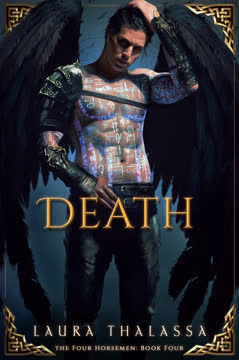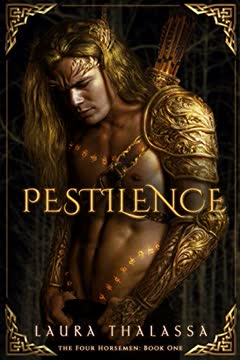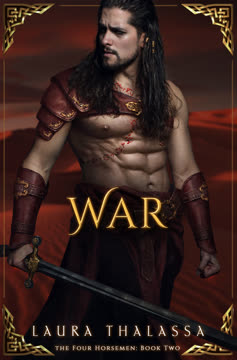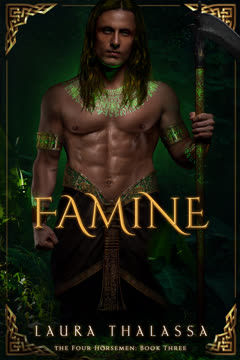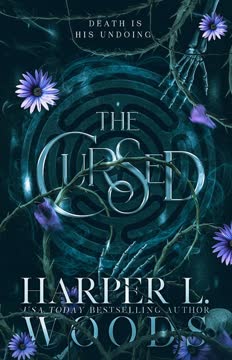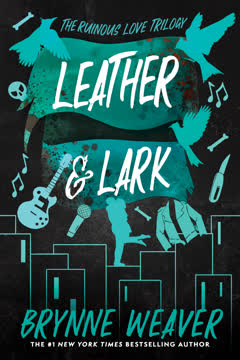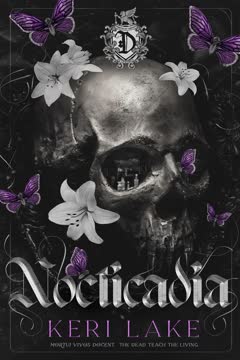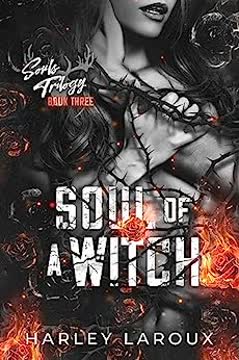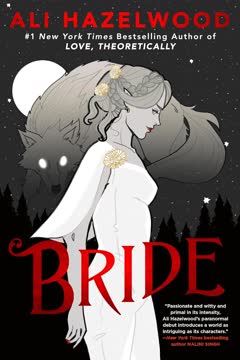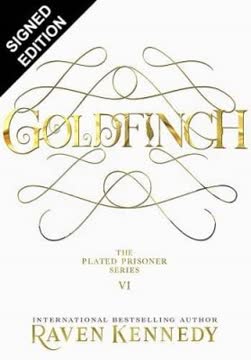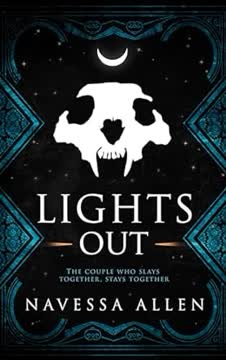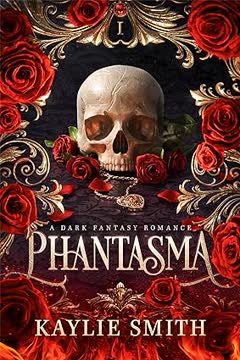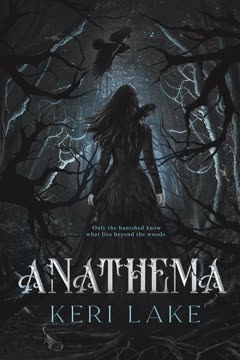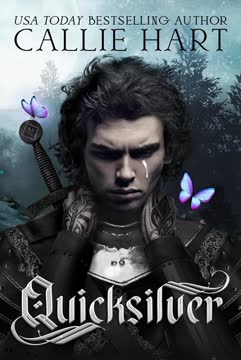Plot Summary
The Market Falls Silent
Lazarus, a young woman in post-apocalyptic Georgia, is running errands for her niece's birthday when the world abruptly changes. Animals panic, and then, in a heartbeat, everyone around her drops dead. She alone remains, untouched by the mass death. In the stunned silence, she meets Death himself—a winged, armored horseman, the last of the Four Horsemen. He is both beautiful and terrifying, and he is shocked to find her alive. Their eyes meet, and something ancient and fateful stirs between them. Death flees, leaving Lazarus to discover the devastation: her entire town, including her beloved family, is gone. She is left with only her grief and the knowledge that she cannot die.
Death's Arrival, Family's End
Lazarus races home, desperate to find her family alive, but the horror only deepens. Her siblings, nieces, nephews, and mother are all dead, frozen in the midst of daily life. The house, once full of warmth and noise, is now a tomb. Overwhelmed by loss, Lazarus is forced to confront her own strange immortality—she has survived plagues, violence, and now the touch of Death himself. The world is empty, and she is left to wander, haunted by memories and the question of why she alone remains. The crushing solitude and the weight of survival set her on a new, desperate path.
The Girl Who Won't Die
Lazarus's inability to die is both a curse and a mystery. She recalls her origins: found as a baby in a city of corpses, adopted by a grieving woman who lost her own family to Pestilence. Lazarus has survived every attempt on her life, from accidents to murder. Now, with her family gone and her town destroyed, she is driven by a new purpose. She vows to stop Death, the last horseman, believing that if she alone can survive him, she must be the one to end his reign. Her journey becomes one of vengeance, hope, and the search for meaning in a world emptied of love.
A Vow to Stop Him
Lazarus sets out across the devastated South, witnessing the aftermath of Death's passage: towns emptied, cities razed, bodies left to rot. She is alone, but her resolve hardens. She tracks Death, learning his patterns, and tries to warn the living, but most dismiss her as mad. In Lexington, Kentucky, she finally convinces the authorities of the threat, demonstrating her unnatural healing. Together, they set a trap for Death, hoping to do what no one else has—bring down an angel. The plan is desperate, but it is the only hope left for humanity.
The Second Encounter
In Lexington, Lazarus and the townspeople ambush Death, unleashing a hail of arrows. For the first time, the horseman falls, wounded and vulnerable. Lazarus, both horrified and protective, claims his body, determined to keep him from rising and killing again. She drags his heavy, winged form away, haunted by the intimacy of their connection and the guilt of her violence. But Death cannot be killed for long. When he awakens, their struggle turns personal—he is fascinated by her, and she is both repulsed and drawn to him. Their fates are now inextricably linked.
The Arrow and the Angel
Lazarus and Death's encounters grow more charged and complex. She tries to kill him; he tries to kill her, but neither can succeed. Each time, their confrontations end in stalemate, violence, or strange moments of tenderness. Death is tormented by his inability to end her life, and Lazarus is tormented by her growing understanding of his loneliness. As they travel, she witnesses his power to raise the dead, to destroy, and—rarely—to heal. Their relationship shifts from hunter and hunted to something more ambiguous, as obsession and empathy take root.
Warnings and Disbelief
Lazarus continues to warn cities of Death's approach, but skepticism and fear greet her everywhere. She demonstrates her immortality, but most refuse to believe until it is too late. In one city after another, she is met with suspicion, hostility, or outright betrayal. Sometimes, she is used as bait, chained and left for Death to find. Each time, Death spares her but destroys everyone else. The futility of her mission weighs on her, but she cannot stop. The world is shrinking, and hope is fading, but she clings to her vow.
The Trap in Lexington
The ambush in Lexington is both a victory and a tragedy. Death is brought down, but at a terrible cost. Lazarus, forced to confront the consequences of her actions, is left with a wounded, healing horseman. Their dynamic shifts: she is his captor, but he is still the greater power. As they travel together, the lines between enemy and companion blur. Death's fascination with Lazarus deepens, and she is forced to see the being behind the apocalypse—not just a destroyer, but a creature burdened by duty and isolation. The seeds of something new are sown.
Captive and Captor
Lazarus and Death's relationship becomes a battle of wills and desires. They are drawn to each other, even as they fight. Death is tormented by his longing for Lazarus, a longing that rivals his compulsion to kill. Lazarus, in turn, is both repelled and attracted by his vulnerability. Their encounters become increasingly intimate, both physically and emotionally. The world continues to fall, but in the ruins, a strange, forbidden love begins to grow. Each must decide what they are willing to sacrifice—for their cause, for each other, and for the fate of humanity.
The Road to Obsession
As they journey west, Lazarus and Death's connection deepens. They become lovers, their passion both a solace and a torment. Death, for the first time, experiences human longing, jealousy, and hope. Lazarus, for the first time, allows herself to love the enemy. But their union is fraught: Death's purpose is to end the world, and Lazarus's is to save it. The tension between love and duty threatens to destroy them both. When Lazarus discovers a living baby in a city of corpses, her priorities shift—she will do anything to protect this new life, even bargain with Death's brothers.
The Dead Rise
Death's brothers—Pestilence, War, and Famine—find Lazarus and reveal their own change of heart. Each has been redeemed by love, and now they seek to stop Death. Together, they form a fragile alliance, but Death is more powerful than ever. He raises the dead to hunt Lazarus, and the world teeters on the brink. Lazarus is forced to choose: her love for Death, her duty to humanity, and her devotion to the child she has claimed as her own. The stakes are higher than ever, and the final confrontation looms.
The Horsemen Gather
Lazarus bargains with the horsemen to save her son, Ben. In exchange for his life, she agrees to seduce Death, to turn him from his purpose. The horsemen take Ben to safety, and Lazarus becomes Death's willing companion. Their love deepens, but so does the tragedy of their fate. Death is torn between his love for Lazarus and his duty to end the world. The other horsemen prepare for a final battle, knowing that the fate of humanity rests on the outcome of this impossible love.
The Bargain for Ben
Lazarus gives herself fully to Death, hoping to change his heart. Their intimacy is both passionate and painful, as each tries to sway the other. Death is tempted by the possibility of a different life, but the weight of his purpose is crushing. Lazarus, meanwhile, is haunted by the knowledge that her son's life—and the world's—depends on her ability to redeem the unredeemable. The lines between love and manipulation blur, and both are forced to confront the limits of their power.
Seduction and Surrender
Lazarus and Death's love becomes a crucible. They experience the joys and sorrows of human life together—food, laughter, sex, and even sleep. Death is transformed by these experiences, but the call of his duty remains. When Lazarus begs him to spare her son, he is torn. The world is on the brink, and the other horsemen are closing in. In a final act of desperation, Lazarus sacrifices her own immortality, making herself truly mortal for the first time. She hopes that this act will be enough to change Death's heart.
Judgment Day
Death unleashes his full power, bringing about the Last Judgment. The other horsemen fight to stop him, but he is unstoppable. Cities fall, the dead rise, and the world is unmade. Lazarus, now mortal, confronts Death one last time. She chooses to die by her own hand rather than let him destroy everything. Her sacrifice is both an act of love and defiance. Death is shattered by her loss, forced to choose between his purpose and his heart.
The Last Sacrifice
Lazarus's soul is led to the afterlife by Death, who is both her lover and her ferryman. In the beyond, she is reunited with her family and offered peace. But Death cannot let her go. He realizes, at last, that the true lesson was not about life or death, but about love. The Universe has given him a choice: fulfill his duty or choose love. For the first time, Death chooses love, forsaking his purpose and his immortality for Lazarus and for humanity.
Love Beyond Death
Death's choice remakes the world. The apocalypse ends, and the survivors begin to rebuild. Death becomes mortal, learning to live, love, and grow old alongside Lazarus and their found family. The other horsemen, too, are redeemed, and together they create a legacy of hope. The scars of the past remain, but so does the promise of a future. In the end, love proves stronger than fate, and even Death is transformed by it.
The World Remade
Years pass. Death and Lazarus live a full, human life, raising children and grandchildren, surrounded by the families of the other horsemen. When Lazarus dies, Death grieves, but knows they will meet again. At the end of his own life, he is reunited with her in the afterlife, where love endures beyond all endings. The world, once doomed, is remade by the power of sacrifice, forgiveness, and the choice to love. The story closes on a flicker of hope—a single light shining in the darkness, a testament to the resilience of life.
Characters
Lazarus Gaumond
Lazarus is a woman marked by loss and resilience. Found as a baby in a city of corpses, she is adopted by a grieving mother and grows up in a world haunted by the Four Horsemen. Her inability to die is both a curse and a gift, isolating her from others but also making her uniquely suited to confront Death. Driven by grief and a fierce sense of justice, she becomes humanity's last hope, vowing to stop Death's rampage. Lazarus is compassionate, stubborn, and deeply empathetic, but also haunted by survivor's guilt. Her journey is one of transformation—from vengeance to love, from immortality to true humanity. Her relationship with Death is fraught with pain, passion, and ultimately, redemption. She is both Death's adversary and his salvation, embodying the paradox of life and death entwined.
Thanatos (Death)
Thanatos is the final horseman, the embodiment of death itself. He is ancient, powerful, and burdened by duty. Clad in silver armor and black wings, he is both awe-inspiring and terrifying. Initially, he is remote, pitiless, and resigned to his task of ending the world. However, his encounter with Lazarus awakens something long dormant—a yearning for connection, understanding, and love. Thanatos is tormented by his inability to kill Lazarus, and this frustration evolves into obsession, then love. He is both destroyer and healer, capable of raising the dead and granting mercy. His journey is one of self-discovery, as he learns the meaning of humanity, vulnerability, and choice. Ultimately, he is redeemed by love, choosing Lazarus and life over his divine purpose, and embracing mortality for the first time.
Ben
Ben is a baby found alive in a city of corpses, echoing Lazarus's own origins. His survival is a miracle, and he becomes the focal point of Lazarus's love and sacrifice. Ben represents the possibility of new beginnings in a dying world. His presence forces Lazarus to confront her priorities, and her willingness to bargain for his life becomes the catalyst for the final confrontation with Death. Ben's innocence and vulnerability highlight the stakes of the apocalypse, and his eventual reunion with Lazarus and Death symbolizes the restoration of hope and family.
Pestilence (Victor)
Pestilence is the harbinger of plague, responsible for the deaths of millions, including Lazarus's birth parents. Once pitiless, he is transformed by love and becomes a champion for humanity. As a mortal, he is wise, gentle, and deeply remorseful for his past actions. He serves as a mentor and ally to Lazarus, offering guidance and support. Pestilence's journey from destroyer to protector mirrors the series' central theme of redemption through love.
War
War is the second horseman, a figure of violence and conflict. He is both terrifying and charismatic, thriving on battle but ultimately choosing love and family over destruction. War is pragmatic, strategic, and fiercely loyal to those he cares about. His willingness to fight—and die—for his brothers and for humanity underscores the power of choice and the possibility of change, even for the most hardened souls.
Famine
Famine is the most cynical and abrasive of the horsemen, wielding the power to destroy crops and starve nations. He is slow to change, clinging to his purpose even as his brothers turn away from theirs. However, love and the example of others eventually soften him, and he becomes a crucial ally in the final battle. Famine's struggle with his own nature and his eventual embrace of mortality highlight the difficulty—and necessity—of transformation.
Jill Gaumond
Jill is Lazarus's adoptive mother, a woman who has endured unimaginable loss but remains compassionate and brave. She rescues Lazarus as a baby and raises her with love and resilience. Jill's death is a defining trauma for Lazarus, and her brief resurrection in the afterlife provides closure and a final lesson: to let go and accept the natural order of life and death. Jill embodies the enduring power of maternal love and the wisdom of acceptance.
The Universe (God)
The Universe, or God, is a silent but omnipresent force throughout the story. She sets the horsemen on their path, intervenes at crucial moments, and ultimately offers the choice that defines the fate of the world. Her presence is felt in moments of coincidence, intercession, and revelation. The Universe's challenge to Death—to learn love, not just life—shapes the entire narrative, making her both the antagonist and the source of hope.
The Skeletons (Death's Servants)
The skeletons are the reanimated dead who serve Death, performing tasks from cooking to protection. They are mindless, yet their presence is a constant reminder of Death's dominion and the thin line between life and death. They also serve as a bridge between the mortal and the supernatural, highlighting the strangeness and loneliness of Death's existence.
The Sixty-Six (Marauders)
The Sixty-Six are a group of outlaws who capture and abuse survivors, including Lazarus. They represent the worst of humanity—violence, exploitation, and the will to power. Their actions force Lazarus and Death to confront the limits of justice, vengeance, and forgiveness. Their defeat by Death's hand is both a moment of horror and a necessary reckoning, underscoring the story's exploration of good, evil, and the gray areas in between.
Plot Devices
Immortality and the Power of Choice
The narrative is structured around the tension between immortality and mortality, both literal and metaphorical. Lazarus's inability to die sets her apart, making her both a target and a hope. Death's own immortality is a burden, chaining him to a purpose he did not choose. The story uses these conditions to explore the meaning of choice: the power to love, to sacrifice, and to change. The ultimate plot device is the choice each character must make—between duty and desire, destruction and redemption, life and love.
The Four Horsemen as Archetypes
Each horseman represents a different aspect of the apocalypse—plague, war, famine, and death—but also a different path to redemption. Their journeys mirror the stages of human suffering and the possibility of change. The gathering of the horsemen for the final confrontation is both a fulfillment of prophecy and a subversion of it, as love and sacrifice prove stronger than fate.
Resurrection and the Afterlife
The ability to raise the dead, both as mindless revenants and as true resurrections, is a central device. It forces characters to confront the meaning of life, the pain of loss, and the wisdom of letting go. The afterlife is depicted as a place of reunion and peace, but also as a choice—one that even Death must make. The final journey to the beyond is both a literal and symbolic crossing, where love is the only thing that endures.
Seduction as Salvation
The central romance between Lazarus and Death is not just a love story, but the engine of the plot. Seduction is both literal and metaphorical—a means of changing hearts, breaking curses, and rewriting destiny. The physical and emotional intimacy between the characters is used to explore vulnerability, trust, and the transformative power of love. The story's climax hinges on the willingness to surrender, not just to each other, but to the possibility of a different future.
Foreshadowing and Fate
The narrative is laced with foreshadowing: the repeated references to fate, prophecy, and the hand of God. Seemingly random events—Lazarus's survival, Ben's discovery, the timing of encounters—are revealed to be acts of intercession, shaping the characters' paths. The story plays with the tension between destiny and free will, ultimately suggesting that love is the force that can break even the most ironclad fate.
Analysis
Death by Laura Thalassa is a sweeping, emotionally charged reimagining of the apocalypse as a crucible for love, sacrifice, and transformation. At its heart, the novel asks what it means to be human in the face of annihilation. Through the lens of Lazarus and Death's relationship, the story explores the paradoxes of existence: the longing for connection in a world of loss, the tension between duty and desire, and the possibility of redemption even for the most fallen. The use of immortality and resurrection as plot devices allows for a deep meditation on grief, hope, and the wisdom of letting go. The narrative structure—alternating between action, intimacy, and philosophical reflection—mirrors the emotional journey of the characters, drawing the reader into their struggles and triumphs. Ultimately, the novel suggests that love is the only force powerful enough to change fate, heal wounds, and remake the world. In a time of uncertainty and fear, Death offers a vision of hope: that even at the end of all things, we can choose to love, and in doing so, create a new beginning.
Last updated:
Review Summary
Death received mixed reviews, with many praising it as a satisfying conclusion to the Four Horsemen series. Readers enjoyed the romance between Death and Lazarus, the character development, and the appearances of other horsemen. However, some found the plot repetitive and similar to previous books. The steamy scenes and emotional moments were highlights for many. Critics noted pacing issues and felt certain plot elements were underdeveloped. Overall, fans of the series appreciated the book's romantic elements and epic finale, while others found it less engaging than earlier installments.
